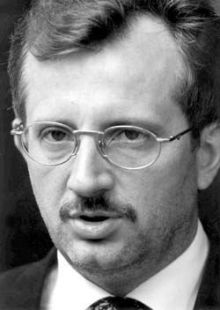On Jan. 1, 2008, Slovenia took over the presidency of the European Parliament. The previous week in Strasburg I had an opportunity to become personally acquainted with its program, which was presented by Slovenia’s Prime Minister Janez Jansa. The program is ambitious but realistic. Slovenia never overestimates its capabilities.
This presidency is sure to leave a notable trace in the history of the European Union. Slovenia is the first of the new EU members to be granted the honor of presiding over the European Union. Moreover, it’s one of the smallest European countries with a very feeble representation in the European community. Slovenia only has seven representatives in the European Parliament and four votes in the EU Council.
New or old, big or small - does it really matter? Not in Slovenia’s case. It is a new EU member, but it is very strong economically. Since 1988 Slovenia has increased its GNP from 4,000 to 22,000 Euros per capita, which equals 91 per cent of the average European level. Slovenia’s economy is growing at a rate of nearly six per cent annually, and the unemployment level is the lowest. It was the only country among the “newcomers” that joined the Euro zone in 2007. “Had someone predicted such a possibility 20 years ago in my prison cell, I would not have believed a word of it,” said Jansa in Strasbourg.
Slovenia is a small country but a very optimistic one. Since 1991 it has survived an extraordinary transition from a weak, newly-independent country to a successful, rapidly-developing democracy.
Emerging from the Balkans, one of the most conflict-ridden parts of Europe, it has become one of the most prosperous countries, at least among the new EU members, and it is totally unlike its Balkan neighbors.
Speaking about the major priorities of Slovenia’s presidency, Jansa emphasized the Lisbon Treaty Ratification. The Slovenian government is going to do its best to lead Europe by avoiding any questions about the evolution of the European community. The Slovenians will insist that the majority of the EU members ratify the treaty before the end of their presidency. Their goal is to make the treaty work from Jan. 1, 2009.
Another priority on the agenda is the future of the Western Balkans. Not unexpectedly, Slovenia is willing to serve as a bridge between the Balkan countries and broaden the European perspective for the region during the term of its presidency. If there is a country inside the EU that can naturally find a solution for stabilizing the Balkan region, Slovenia is the one. Cultural and historical ties have made Slovenia an expert on Balkan problems. In particular, Slovenia will try to accelerate the negotiations with the Balkan countries and finalize a number of treaties on stabilization and association. Slovenia is going to focus on Kosovo and will try to solve the problem of Kosovo’s independence without offending the Serbs’ national dignity. The results are difficult to be predicted. We can only hope that such a small country as Slovenia will be a better broker than great and powerful nations or organizations.
In conclusion, I am totally convinced that this presidency will have some added value. Slovenia has tremendous potential, as I have already mentioned, which will bring the EU some positive, fruitful results. Slovenia’s history of success will prove that the size of a country and the number of its population are not the only things that are considered and rewarded in the EU. Slovenia, being the best student in the subject of European integration, is respected and recognized by the leading EU countries. Rewards are a matter of time.







